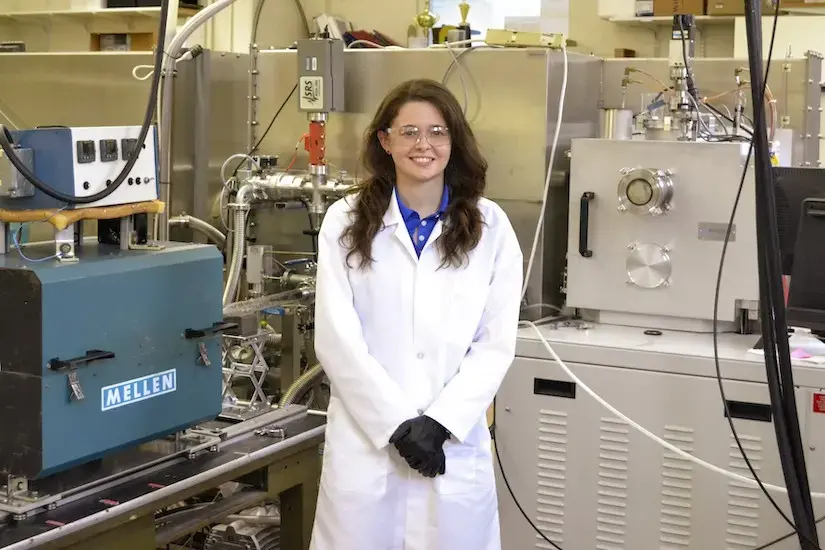When Katy Jinkins graduated from the University of Wisconsin-Platteville with a degree in engineering physics and a National Science Foundation Graduate Research Fellowship, she was only 19, a feat that merited coverage in the local newspaper. Now, Jinkins’ age is once again headline news: Forbes named the UW-Madison grad (PhDMS&E ’20) to its 2025 30 Under 30 list in the manufacturing and industry category. Jinkins is co-founder of Middleton, Wisconsin-based spinoff company SixLine Semiconductor, which is commercializing methods for aligning carbon nanotubes that she developed as part of her PhD.
“It’s been a steep learning curve, obviously, going from being a scientist to being more entrepreneurial-focused,” says Jinkins, who attended the Morgridge Entrepreneurial Boot Camp at UW-Madison and took advantage of other campus resources to prepare herself for the business side of science. “But I’m really enjoying a lot of the aspects. I think it’s been a great experience.”
During her undergrad, Jinkins says she had an opportunity to work with graphene, a 2D or “quantum” material composed of a layer of carbon atoms just one atom thick. When shrunk to these dimensions, the material takes on impressive qualities, including high thermal and electrical conductivity as well as super strength.
Jinkins knew she wanted to work with similar materials in grad school and began looking around for a lab investigating it. When she met Mike Arnold, the Beckwith-Bascom Professor in materials science and engineering at UW-Madison, during a grad school visit, his lab was just what she was looking for. The fact that he was based in Wisconsin, not too far from home, she says, was just a happy coincidence.
One of Arnold’s primary research fields is carbon nanotubes. Rolling graphene into nanoscopic cylinders leads to a wide array of electrical and physical properties. One of the most promising applications is using the tubes as transistors for computer chips, where they are five times as energy-efficient and five times faster than silicon transistors.
For the tiny tubes—about 100,000 times smaller than the width of human eyelash—to work as transistors, they all need to be aligned in the same direction and spaced properly. That has proved to be a difficult feat of fabrication.
But Jinkins and Arnold pioneered methods of aligning the tubes using fluid flow. In one technique, the nanotubes are just aligned in the bulk fluid, while modifications enable the nanotubes to form 2D liquid crystals. During these processes, the nanotubes are aligned across target substrates in uniform films. Not only are the processes quick and cheap, they are also compatible with current equipment used in the semiconductor industry.

After graduation, Jinkins completed a postdoc at Northwestern University focused on novel wearable and implantable bioelectronics. However, she was always very interested in starting a company around her PhD technology and came back to Madison in 2022 to found SixLine with Arnold.
The spinoff company is working to refine and commercialize these nanotube alignment processes. Besides Jinkins and Arnold, the company has two full-time technical employees who currently work out of labs and shared user facilities at UW-Madison through an industry user agreement. Padma Gopalan, another UW-Madison professor of materials science and engineering and co-inventor of the nanotube technology, and Jeff Moore, an experienced startup entrepreneur, serve as advisors.
Jinkins says most of her time is focused on administration and big-picture planning for the company, which is currently raising pre-seed funding. But, she says she’s happy to jump back into lab work anytime the team needs guidance or an extra set of hands.
SixLine was awarded a National Science Foundation Phase I Small Business Technology Transfer grant in 2023, and Jinkins earned a 2023 Activate Fellowship, a two-year immersive experience that helps transform scientists into entrepreneurs.
In 2024, the company earned its first revenue, delivering aligned nanotube films to two semiconductor companies that are measuring the device performance and figuring out ways to integrate the nanotubes into their products. Jinkins says in the coming year, SixLine plans to continue raising pre-seed funding, will hire another technical staff person, and is in talks with other semiconductor manufacturers who want to work with its nanotube films.
Jinkins says the company is working with feedback from these customers to refine its films. SixLine is also focused on improving the electronic quality of the films to make them suitable for wireless or radio-frequency devices.
While many technologies are vying to take computing beyond silicon, Jinkins says she’s confident that nanotubes will be part of the future. “Carbon nanotubes are already on the materials roadmap for big semiconductor companies like TSMC,” she says. “The industry is investing in developing the technology because they see the need for a new material to enable devices to shrink while generating more computational power and using less energy.”
As SixLine continues to grow, Jinkins plans to grow with it. “I really want to see how far this technology can go,” she says. “And I think I’m the best person for that, because I have the most experience and I am willing to get down in the trenches and learn.”
Top image caption: Katy Jinkins presents SixLine Semiconductor’s technology at the Plug and Play Semiconductors Showcase and Expo in Florida in October, 2024. Submitted photo.